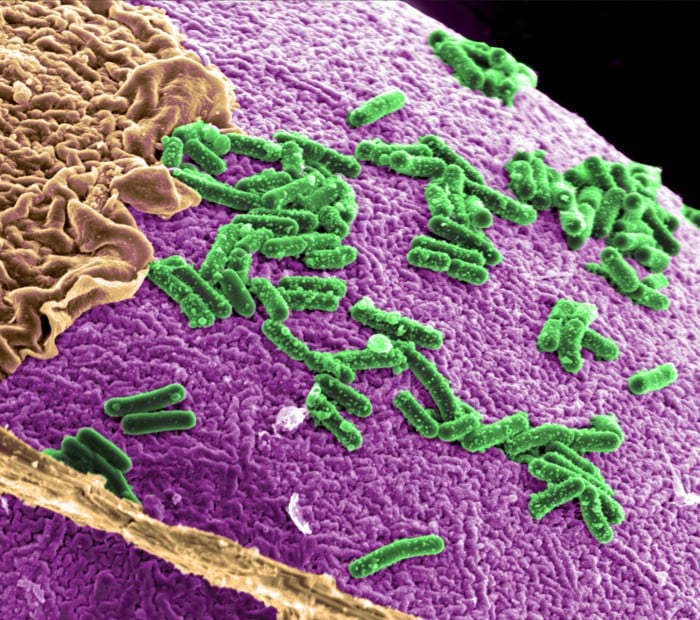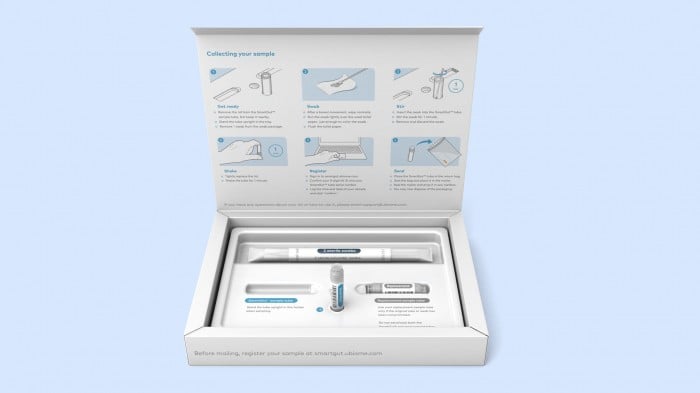Gut Check: Scientists are Wary of At-Home Microbiome Tests

The idea that different types of bacteria in the human gut play a role in health and disease is driving a new trend in consumer-oriented health-care kits.
Startups are offering new services to analyze the complex community of microörganisms that live in the digestive tract—called the microbiome. Customers receive test tubes in the mail and send them back with fecal swabs to be analyzed in a lab. The companies say they can do things like make diet recommendations and predict risk for certain diseases based on a person’s unique microbial makeup.
While these tests could probably tell if you have a serious bacterial infection, scientists say they can’t yet diagnose patients with diseases and they are doubtful the tests can reliably provide the kind of personalized information their makers claim they will.
“The enthusiasm of their manufacturers simply goes well beyond where the science is right now,” says Rob Knight, a leading microbiome researcher and professor at the University of California, San Diego. Knight is the cofounder of the American Gut project, a crowdfunded study to map the human gut.
In recent years, researchers have found that changes in the body’s microbial ecosystems are linked to a whole range of different medical conditions, from gastrointestinal problems to diabetes and even Parkinson’s disease. Knight says there’s great potential for developing microbiome-based diagnostics in the future, which is why so much excitement exists for these new tests.
One new startup, Thryve, began offering a monthly microbiome testing subscription service in February starting at $59.95 a month. CEO Richard Lin says the company uses machine learning to generate customized reports showing the breakdown of a person’s gut bacteria. The reports also give advice like which fibrous foods to eat or probiotics to drink to improve “good” bacteria. Customers have access to an online platform with a chatbot that asks them questions about what they ate that day and whether they exercised or took dietary supplements.
Meanwhile, San Francisco-based company uBiome launched a service in November that detects microörganisms that may contribute to common gut symptoms, including constipation, bloating, diarrhea, and gas. Called SmartGut, it can only be ordered by a medical professional and is fully or partially covered by most health insurance companies.

CEO Jessica Richman says the test compares patients’ microbiomes to healthy ones based on the company’s data set and peer-reviewed scientific studies to determine risk factors for conditions like diabetes, obesity, and kidney stones.
“We’ve chosen those specific conditions because we believe there is enough data to support the presentation of a risk factor. Currently, we do not diagnose any disease through testing; we just offer risk factors that are part of the picture for doctor and patient,” Richman says. The company is also developing diagnostic tests that will need to get approval from the U.S. Food and Drug Administration.
Knight says what people can realistically expect to learn from these new commercial tests is more along the lines of a snapshot of how a participant’s microbiome compares to others with different diets, ages, and lifestyles, or in different places around the world. The American Gut project gives this kind of analysis without making disease risk predictions or doling out health advice.
Indeed, there’s a lot we don’t know about the microbiome and its connection to our health. Jack Gilbert, faculty director of the Microbiome Center at the University of Chicago, says many studies of it have been conducted in small groups of patients and only point to correlative relationships, not causative ones. For example, a lack of diversity in the types of bacteria in the gut is thought to be associated with disease.
Gilbert says it might be possible to find out how the microbiome is affecting a person’s disease or make tailored dietary recommendations, but it would require much more data and monitoring over several months or even years. For companies to do that well, he estimates, it would cost consumers $5,000 to $6,000.
The ideal way to observe such changes would be in a long-term study where people are enrolled before they get sick, then studied as they get sick so researchers can test whether they can predict the disease from changes in the microbiome before they happen, Knight says.
As for dieting, most people probably don’t need a microbiome test to tell them to eat healthier, says Gary Wu, a professor of gastroenterology at the University of Pennsylvania and scientific advisory board member for the American Gastroenterological Association Center for Gut Microbiome Research & Education.
This doesn’t mean people shouldn’t get their microbiomes sequenced. Knight says people should do it if they’re interested in finding out about the different species of bacteria that make up their microbiome. And Wu is enthusiastic about these kinds of consumer-oriented tests because they “engage the layperson in science.”
Deep Dive
Biotechnology and health
How scientists traced a mysterious covid case back to six toilets
When wastewater surveillance turns into a hunt for a single infected individual, the ethics get tricky.
An AI-driven “factory of drugs” claims to have hit a big milestone
Insilico is part of a wave of companies betting on AI as the "next amazing revolution" in biology
The quest to legitimize longevity medicine
Longevity clinics offer a mix of services that largely cater to the wealthy. Now there’s a push to establish their work as a credible medical field.
There is a new most expensive drug in the world. Price tag: $4.25 million
But will the latest gene therapy suffer the curse of the costliest drug?
Stay connected
Get the latest updates from
MIT Technology Review
Discover special offers, top stories, upcoming events, and more.